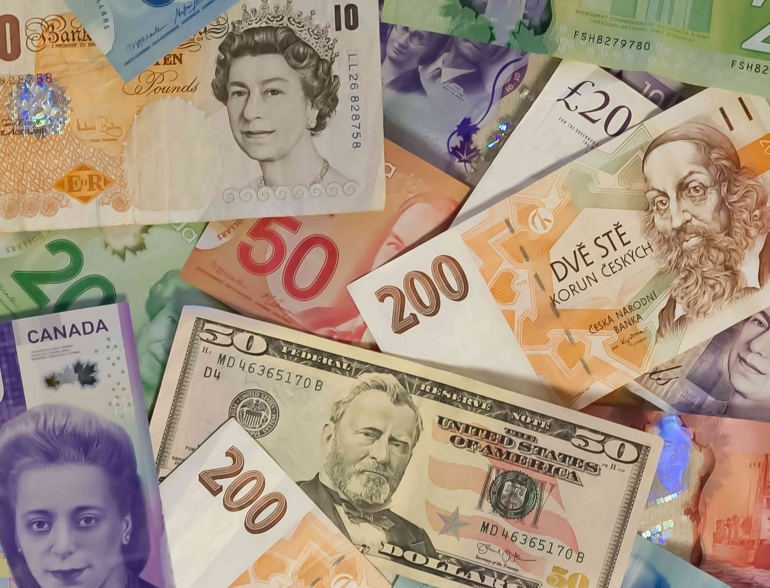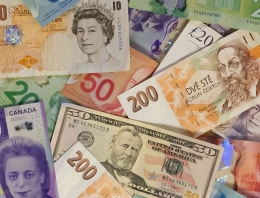The BRICS, a grouping of five major emerging economies, including Brazil, Russia, India, China, and South Africa, has been in the limelight for its potential to reshape the global economic order. In this opinion piece, we will delve into the reasons why it has become the world's attention lately and their aspirations for de-dollarization.
Jim O’Neill, then-chairman of Goldman Sachs Asset Management, first introduced the term BRIC in 2001, to describe the fast-growing economies of Brazil, Russia, India, and China. South Africa was added to the group in 2010, making it BRICS. The first BRIC summit was held on June 16th, 2009, with the objective of increasing economic and political cooperation between its members. Together, they represent a significant portion of the world's population and economic output, making them an influential force in the global economy. In 2020, their combined GDP was approximately more than $17 trillion, and their population accounted for over 3 billion people. China alone accounts for nearly 18% of global GDP, while India and Brazil are also among the world's top ten largest economies.
Lately, BRICS has been the center of attention due to its growing economic and political influence. As countries in the West continue to face economic challenges, BRICS offers a new model of economic growth and development that emphasizes investment in infrastructure, education, and innovation. Unlike traditional Western development models, which rely heavily on foreign aid and market liberalization, BRICS has focused on building self-reliant economies that are less vulnerable to external shocks. For instance, China's Belt and Road Initiative (BRI) has helped to bridge the infrastructure gap in Asia and Africa, while India's "Make in India" initiative aims to promote domestic manufacturing and reduce imports. Additionally, Brazil has invested heavily in renewable energy and agriculture, while Russia has prioritized the development of its technology and natural resource sectors. Overall, the BRICS countries offer a diverse range of economic models that challenge the traditional Western development paradigm.
BRICS also offers an alternative vision of global governance, challenging the Western-dominated international institutions such as the IMF and World Bank. The group has established its own development bank, the New Development Bank, and a contingency reserve arrangement (CRA), which is a framework for providing financial assistance to member countries in times of crisis. This shows that BRICS countries are willing to take the lead in shaping the global economic agenda and challenging the status quo. As the world becomes more multipolar, BRICS will continue to play a key role in shaping the future of the global economy.
It is true that BRICS has shown interest in creating its own currency to reduce its dependence on the US dollar. BRICS has not proposed or sought to create a new currency for its member countries. However, there have been some discussions among the member countries about reducing their reliance on the US dollar for international trade and transactions, and increasing the use of their own national currencies, as well as other major currencies such as the euro and yen, for cross-border transactions. This is seen as a way to reduce currency risk and promote economic cooperation among BRICS member countries. Nevertheless, there are no concrete plans or proposals for a new currency at this time. This idea is flawed for several reasons. Firstly, the economies of BRICS countries are not sufficiently integrated to create a unified currency. Secondly, the creation of a new currency will require the cooperation of all BRICS members, it is a daunting task given their divergent economic and political interests. Here are some further ideas to consider regarding the potential drawbacks of implementing a single currency for the BRICS countries:
- A unified currency would require a centralized monetary authority, may present significant obstacles to establish given the varying levels of economic development and inflation rates within the BRICS countries. Leads to disagreements on monetary policy and hinder the effectiveness of the currency;
- Creating a new currency may face challenges in gaining global acceptance, competing with established currencies like the US dollar, euro, and yen, which could limit its usefulness, adoption, and impact in reducing dependence on the US dollar.;
- The creation of a new currency also lead to increased currency volatility and uncertainty, which negatively impact trade and investment within the BRICS countries. This may prove to be especially difficult for emerging market economies that are already vulnerable to external shocks and fluctuations in global markets.
Despite the limitations of creating a new currency, BRICS is taking bold steps towards de-dollarization. The group has been exploring the use of local currencies in their trade transactions, reducing their reliance on the US dollar. One of the key reasons why BRICS is exploring de-dollarization is to reduce its vulnerability to the US sanctions. In past few years, the US has used the dominance of the US dollar in international transactions as a weapon to punish countries that do not comply with its policies. This has made many countries, including BRICS members, more cautious about relying too heavily on the US dollar.
BRICS countries can reduce their reliance on the US dollar and minimize the effects of US sanctions by utilizing local currencies in their trade deals. In the event of US sanctions against a BRICS member, trading with other members using local currencies enables them to circumvent the need for US dollars. This can alleviate the sanctions impact and limit the economic and political sway that the US holds over countries.
Indonesia, a BRICS outreach dialogue partner, stands to benefit greatly from the group's initiatives. By reducing its reliance on the US dollar, Indonesia can increase its economic resilience and minimize the impact of global economic shocks. The creation of new financial institutions by BRICS will also provide much-needed funding for infrastructure development, a major challenge for Indonesia.
BRICS is a force to be reckoned with, and its potential to reshape the global economic order cannot be underestimated. Although the creation of a new currency may not be feasible at the moment, the group is taking bold steps towards de-dollarization. As a member of the BRICS outreach dialogue, Indonesia has a lot to gain from these initiatives, and its participation in the group's efforts could be a game-changer for the Indonesian economy and its people.
Picture : John McArthur
Follow Instagram @kompasianacom juga Tiktok @kompasiana biar nggak ketinggalan event seru komunitas dan tips dapat cuan dari Kompasiana. Baca juga cerita inspiratif langsung dari smartphone kamu dengan bergabung di WhatsApp Channel Kompasiana di SINI







